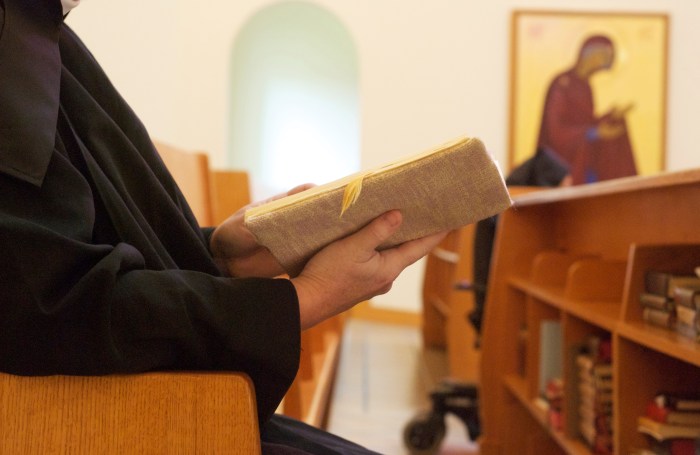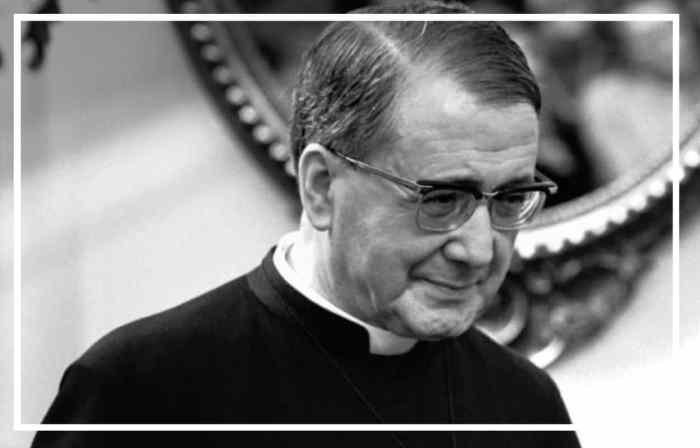Embark on a captivating journey with the “Opus Work of God Crossword,” where the sacred meets the secular, and the power of words unveils the mysteries of faith and the human experience.
This crossword puzzle delves into the rich tapestry of religious and artistic traditions, challenging solvers to unravel the intricate connections between the divine and the mortal.
Opus

Opus, a Latin term, has a rich etymology and historical significance. Its origin can be traced back to the Latin word “opus,” which means “work” or “creation.” In ancient Rome, the term was used to refer to any work of art, literature, or music.
It was commonly used to describe large-scale projects, such as architectural structures, sculptures, and literary compositions. Over time, the term “opus” came to be associated specifically with musical compositions, particularly extended works or collections of pieces.
Usage in Music
In the context of music, an opus number is assigned to a musical composition to identify it within the composer’s body of work. The opus number is typically followed by a sequential number, indicating the order in which the composition was created.
For example, Ludwig van Beethoven’s Symphony No. 5 is also known as his “Opus 67.” Opus numbers help catalog and organize a composer’s works, providing a chronological record of their creative output.
Usage in Art and Literature
Beyond music, the term “opus” is also used in the fields of art and literature. In art, it can refer to a specific work or body of work by an artist. For instance, Vincent van Gogh’s famous painting “The Starry Night” is often referred to as his “Opus 363.” In literature, an opus can refer to a major work by an author, such as a novel, play, or collection of poems.
For example, James Joyce’s seminal work “Ulysses” is considered his “Opus Magnum” or “Great Work.”
Work of God

The phrase “work of God” holds profound significance in biblical and theological discourse, encompassing both the act of creation and the ongoing presence of God in the world.
Solving the opus work of god crossword can be a real brain-teaser. But when you’re stuck, don’t despair! A quick search online can lead you to helpful resources like this article on spiked wheels on a spur. With a little extra knowledge, you’ll be able to complete the crossword in no time!
In the biblical context, the “work of God” primarily refers to the creation of the universe and all that it contains. The opening chapters of Genesis depict God’s creative acts, culminating in the creation of humankind in His image. This account emphasizes God’s sovereignty and power, as well as His purpose in creating a world that reflects His glory.
Theological Implications
The theological implications of God’s creation are multifaceted. Firstly, it establishes God as the ultimate source and sustainer of all things. The creation narrative underscores that the world is not self-existent but rather dependent on God’s will and power.
Secondly, the work of God challenges human pride and self-sufficiency. By recognizing that we are created beings, we acknowledge our dependence on God and our place within His created order. This perspective fosters humility and gratitude, leading us to worship and glorify the Creator.
Thirdly, the work of God reveals His love and goodness. The creation of a beautiful and intricate world testifies to God’s benevolent nature and His desire for us to enjoy and appreciate His creation.
Relationship to Human Agency
While God is the ultimate creator, the Bible also affirms the role of human agency in His work. Humans are given the responsibility to steward and care for the creation, using their God-given abilities to cultivate and develop the world around them.
This partnership between God and humanity is evident in various biblical accounts, such as the story of Noah and the ark, where God commissions Noah to build a vessel to save his family and animals from the flood. Similarly, in the book of Exodus, God chooses Moses to lead the Israelites out of slavery in Egypt, demonstrating that God works through human agents to accomplish His purposes.
Crossword Puzzle Analysis

Crossword puzzles are a popular and challenging word game that can be enjoyed by people of all ages. One of the most common types of clues in crossword puzzles is the “opus” clue, which refers to a work of art or music.
These clues can be tricky to solve, but they can also be very rewarding.
There are a few different types of opus clues that you may encounter in a crossword puzzle. One type of clue simply asks for the title of a work of art or music. For example, the clue “Opus 131” might refer to Beethoven’s Ninth Symphony.
Another type of opus clue asks for the composer or artist who created a work of art or music. For example, the clue “Composer of ‘Opus 100′” might refer to Franz Schubert.
Finally, some opus clues ask for a specific detail about a work of art or music. For example, the clue “Opus that includes the ‘Moonlight Sonata'” might refer to Beethoven’s Piano Sonata No. 14.
To solve opus clues, it is important to have a good knowledge of classical music and art. It is also helpful to be familiar with the different types of opus clues that you may encounter. With a little practice, you will be able to solve even the most difficult opus clues.
Word Patterns and Cross-Referencing
In addition to the clues themselves, it is also important to pay attention to the word patterns and cross-referencing in a crossword puzzle. This can help you to narrow down the possible answers to a clue. For example, if you see that a clue is followed by a series of numbers, it is likely that the answer is a date.
Similarly, if you see that a clue is followed by a series of letters, it is likely that the answer is an abbreviation.
By paying attention to the word patterns and cross-referencing in a crossword puzzle, you can increase your chances of solving the puzzle correctly.
Famous Opus Works

Throughout history, numerous musical, artistic, and literary works have been bestowed with the title “opus,” signifying their exceptional quality and significance. These works have transcended the boundaries of time and genre, leaving an enduring legacy that continues to shape our cultural landscape.
The term “opus” originates from the Latin word for “work,” and it is often used to denote a composer’s or artist’s most important or renowned creation. Over the centuries, countless opuses have emerged, each carrying its own unique story and cultural impact.
Musical Masterpieces
- Beethoven’s Symphony No. 9 (Opus 125):This monumental work, known as the “Choral Symphony,” is renowned for its powerful themes of unity, brotherhood, and the triumph of the human spirit. Its final movement features a stirring rendition of Friedrich Schiller’s “Ode to Joy,” which has become a global symbol of hope and inspiration.
- Bach’s Brandenburg Concertos (Opus 3):A collection of six concertos, these works showcase Bach’s unparalleled mastery of counterpoint and orchestration. They have influenced generations of composers and continue to be performed and admired worldwide.
- Mozart’s Piano Concerto No. 21 (Opus 467):Known as the “Elvira Madigan Concerto,” this enchanting piece is known for its lyrical melodies, intricate passages, and captivating cadenzas. It has been featured in numerous films and recordings, captivating audiences with its timeless beauty.
Artistic Achievements
- Michelangelo’s Sistine Chapel Ceiling (Opus Magnus):This breathtaking fresco cycle, located in the Vatican City, is considered one of the greatest artistic achievements of all time. Michelangelo’s depiction of biblical scenes, with its iconic central image of Adam and God, has had a profound impact on Western art and religious thought.
- Leonardo da Vinci’s Mona Lisa (Opus Incertum):This enigmatic portrait, with its mysterious smile and captivating gaze, has captivated art lovers for centuries. It is one of the most famous and recognizable paintings in the world, inspiring countless interpretations and becoming a symbol of the Renaissance era.
- Van Gogh’s Starry Night (Opus 16):This iconic painting depicts a swirling night sky over a small village. Van Gogh’s bold brushstrokes and vibrant colors convey a sense of both wonder and despair, making it a beloved masterpiece of post-impressionism.
Literary Landmarks
- Shakespeare’s Hamlet (Opus Magnum):This tragic masterpiece is considered one of the greatest works of English literature. Hamlet’s complex character and existential themes have resonated with audiences for centuries, making it a timeless exploration of human nature.
- Dante’s Divine Comedy (Opus Sacrum):This epic poem, written in the 14th century, takes readers on a journey through Hell, Purgatory, and Paradise. Dante’s vivid descriptions and allegorical themes have had a profound influence on Western literature and thought.
- Homer’s Iliad (Opus Antiquum):This ancient Greek epic poem tells the story of the Trojan War. Homer’s masterful storytelling and vivid characters have made the Iliad a foundational work of Western literature, inspiring countless adaptations and retellings.
Opus as a Measure of Achievement
In the realm of artistic and intellectual pursuits, the term “opus” holds a profound significance, denoting a work that embodies the culmination of an artist’s or scholar’s creative endeavors and intellectual prowess. It represents a masterpiece, a pinnacle of achievement that transcends the ordinary and leaves an enduring legacy in its wake.
Criteria for Recognition
The recognition of an opus is not a matter of mere subjective opinion but is underpinned by a set of objective criteria that assess the work’s:
- Originality and Innovation:The work breaks new ground, offering a unique and groundbreaking perspective or approach.
- Technical Mastery:The work demonstrates an exceptional level of skill, craftsmanship, and technical expertise.
- Artistic or Intellectual Impact:The work resonates deeply with its audience, provoking thought, inspiring emotion, or enriching understanding.
- Enduring Legacy:The work stands the test of time, continuing to be studied, performed, or referenced long after its initial creation.
Notable Opuses
Throughout history, countless individuals have produced notable opuses that have shaped their respective fields and left an indelible mark on human civilization. Here are a few examples:
- Leonardo da Vinci’s “Mona Lisa”:A masterpiece of Renaissance art, renowned for its enigmatic smile and masterful use of sfumato.
- William Shakespeare’s “Hamlet”:A literary classic that explores the complexities of human nature, featuring iconic characters and timeless themes.
- Ludwig van Beethoven’s “Symphony No. 9”:A musical masterpiece that combines grandeur, emotional depth, and choral elements.
- Albert Einstein’s Theory of Relativity:A groundbreaking scientific theory that revolutionized our understanding of space, time, and gravity.
- Jane Austen’s “Pride and Prejudice”:A beloved novel that offers a witty and insightful portrayal of love, marriage, and social class in Regency England.
Inspiration and Creativity

Creating an opus is a transformative journey that intertwines inspiration, imagination, and unwavering perseverance. It is a process of distilling raw ideas into tangible masterpieces, where the artist’s inner fire ignites the spark of creation.
Inspiration, like a celestial whisper, can strike at unexpected moments, igniting a spark that sets the creative wheels in motion. It can stem from profound experiences, personal reflections, or the beauty of the world around us. The artist’s sensitivity and receptivity to these stimuli become the foundation for their unique artistic expression.
Imagination and Innovation, Opus work of god crossword
Imagination, the boundless realm of possibilities, plays a pivotal role in shaping an opus. It allows the artist to transcend the confines of reality and explore uncharted territories of thought and emotion. Through imagination, they can envision new perspectives, conjure vivid imagery, and create worlds that exist only in their minds.
Perseverance and Dedication
The path to creating an opus is not without its challenges. It requires unwavering perseverance and an unwavering commitment to the craft. The artist must endure countless hours of solitude, self-doubt, and relentless effort to bring their vision to life.
It is through their unwavering dedication and belief in their work that they overcome obstacles and emerge with a masterpiece that resonates with audiences.
Rewards and Legacy
The rewards of creating an opus are immeasurable. The artist experiences a profound sense of fulfillment and self-actualization. Their work becomes a testament to their talent, imagination, and dedication, leaving an enduring legacy that inspires and captivates generations to come.
Frequently Asked Questions: Opus Work Of God Crossword
What is the origin of the term “opus”?
The term “opus” originates from the Latin word for “work” and has been used for centuries to denote a significant work of art, music, or literature.
How does the crossword puzzle relate to the biblical concept of “work of God”?
The crossword puzzle explores the ways in which human creativity and artistic expression can reflect and engage with the divine.
What are some famous examples of “opuses” in history?
Notable opuses include the Sistine Chapel ceiling by Michelangelo, the musical compositions of Beethoven, and the literary works of Shakespeare.